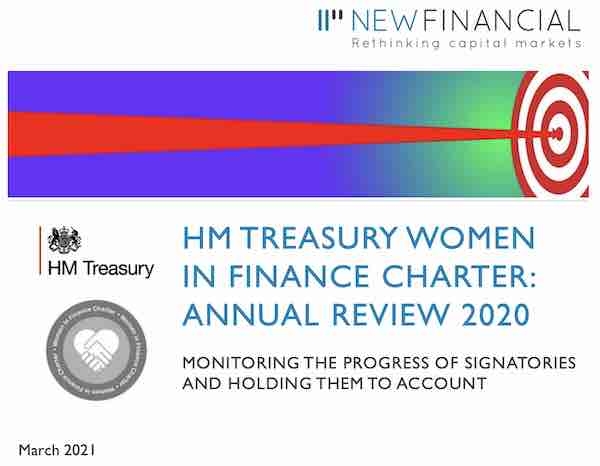The Coronavirus pandemic in 2020 set back the progress of women at middle and senior levels in financial services firms with 30% of Women in Finance Charter members missing their targets.
A report commissioned by the Treasury and carried out by consultants New Financial to review annual progress found that 3 in 10 firms struggled to reach targets.
The report said: “2020 marked the biggest test yet for the 209 Charter signatories. While more than 70% have met or are on track to meet their targets for female representation in senior management, the rest either missed their 2020 deadlines or are falling behind on their future targets.”
The report said many firms who slipped behind were on a trajectory to miss their targets before the pandemic started.
The report said: “While the financial services industry has faced many challenges over the past year, it is disappointing that more than half of signatories with a 2020 deadline missed their targets. This group of 44 firms come from all sectors, and 28 are large (1,001-10,000 employees).
“The 37 signatories that hit their 2020 deadlines increased female representation steadily over the past two years from a higher starting point, while the 44 that missed started from a lower level and flatlined in 2020.”
The reasons for missing targets were usually related to promotion freezes due to the pandemic and over-ambitious targets.
The Charter, launched by the Treasury in 2016, now has more than 400 signatory firms covering 950,000 employees across the sector.
Among the 44 firms to miss their targets were AXA Investment Managers, Blackrock, BNY Mellon, Canada Life, the FCA, Invesco, IRESS, the London Stock Exchange and Quilter.
Among the 37 firms to reach their targets were: Brown Shipley, Charles Stanley, Close Brothers, the CII, Fidelity, LV=, NS&I, Schroders and the Treasury.
Some 35 firms met their targets ahead of deadline including: Aviva, Brewin Dolphin, Hargreaves Lansdown, Janus Henderson, PensionBee, Prudential, Sesame and Yorkshire Building Society.
Charter signatories pledge to promote gender diversity by:
• Having one member of the senior executive team who is responsible and accountable for gender diversity and inclusion.
• Setting internal targets for gender diversity in senior management.
• Publishing progress annually against these targets on a page on the company's website dedicated to their Charter commitment.
• Having an intention to ensure the pay of the senior executive team is linked to delivery against these internal targets on gender diversity.
Overall the report found that most financial firms were “moving in the right direction.”
Just over a third (35%) of the 209 signatories analysed in this review have met their targets for female representation in senior management and a further 36% that have targets with future deadlines said they are on track to meet them.
Three out of five (62%) firms either increased or maintained their proportion of women in senior management during the reporting period.
Speaking at the launch of the review today, FCA CEO Nikhil Rathi said: "This Charter is making a difference. 62% of signatories have seen an improvement in female representation in senior management. But, even among those signatories, women represent less than a third of senior management.
"That matters to a regulator. Research has suggested that greater gender diversity improves risk management culture and decreased the frequency of European banks’ misconduct fines. This Charter challenges regulators and firms to publish measurable targets and actions.
"At the FCA, we set ambitious targets: women accounting for 45% of our senior leadership team by 2020, and half by 2025. That we missed our 2020 target by 5 percentage points shows we too have work to do."
• The Women in Finance Charter Annual Review can be viewed here

